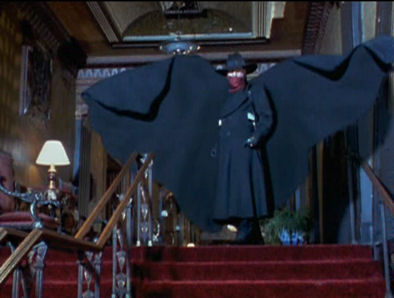 There are currents in the past, deep eddies in the sediment of time. They erode channels through their courses and join together to form deeper cuts, which in turn formed the modern world and all that drowns us within it. This is true for the modern concept of the superhero as much as anything else. Examining the headwaters of this genre requires us to go back “to the thrilling days of yesteryear,” as the Lone Ranger’s radio program used to say. And there are few yesteryear’s as thrilling as The Shadow‘s
There are currents in the past, deep eddies in the sediment of time. They erode channels through their courses and join together to form deeper cuts, which in turn formed the modern world and all that drowns us within it. This is true for the modern concept of the superhero as much as anything else. Examining the headwaters of this genre requires us to go back “to the thrilling days of yesteryear,” as the Lone Ranger’s radio program used to say. And there are few yesteryear’s as thrilling as The Shadow‘s
We in the modern world owe the Shadow’s creators more than almost any other pre-modern superhero scribes (with the possible exception of Johnston McCulley, creator of the masked man known as Zorro). The Shadow and his contemporaries, the “masked adventures” and “mystery men” of inter-war adventure literature, afford us a remarkable opportunity to study a genre in its infancy, its key components only half-formed. In particular, the Shadow offers a peek into the roll popular demand and sheer, blind chance played in creation. Because, if not for the craziest of chances, the Shadow (as we know him) wouldn’t exist at all.
Whoever wrote his Wikipedia entry rightly calls the Shadow an “accident.” He began “life” as a disembodied voice (first James LaCurto’s, then Frank Readick’s) narrating the weekly radio show Detective Stories. Financed by Street & Smith publications, Detective Stories was little more than marketing gimmick for Street & Smith’s Detective Story Magazine. With sales flagged as the Roaring 20s gave way to the Depressed 30s, Detective Story‘s publishers were first bemused and then shocked to realize no one gave a whit for “Detective Story Magazine.” Like the Ancient Greece of Xena’s time, the land in turmoil cried out for a hero. They wanted “the Shadow detective magazine.”
Forced to create such a thing, Street & Smith’s Henry Ralston wrangled pulp author and professional magician Walter B. Gibson into the project. Gibson, under the name Maxwell Grant, churned out hundreds of Shadow stories throughout the 30s and 40s. Other authors took over as demand grew and the Shadow went onto become one of the first cross-media sensations in modern superhero history. For years he carried his own book comic series and radio show (where, most famously, Orson Welles gave him voice). Multi-part serials appeared in movie houses across time and space and two full-length motion pictures were produced in the 1950s…but by then, times had changed. The Shadow’s superhero progeny had long-since left him in their cumulative dust. For decades the character languished in whatever netherworld forgotten creations inhabit. Sam Raimi’s attempt to make a Shadow movie in the 1980s was a spectacular failure.* It took another half-decade for the Shadow to reappear on the big screen. Was it worth the wait?
[*And thank God for that—without that failure, there would’ve been no Darkman and the world would be a sadder place for Dr. Payton Westlake’s absence.]
In a word? No.
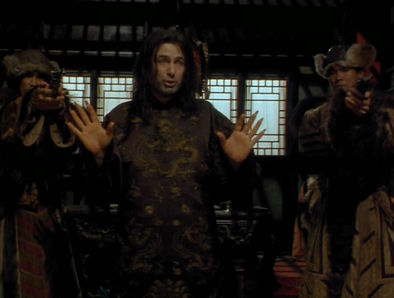 We open in the “opium fields” of Tibet. (As if that’s supposed to help give us a sense of place. Oh, those opium fields. Yeah, I know where we are. There’s only one set of opium fields in Tibet, after all.) Here we meet Yin-ko (Alec Baldwin), an opium- trading warlord of dangerous repute, directing operations which stretch “all across Asia” from his palace of smoking sycophants, obvious concubines, and lion statues. Yin-ko looks and acts like a man fresh from his (no doubt prize-winning) appearance at a Dr. Fu Manchu look-alike contest, and his professional ethics would make the Devil Doctor proud. We enter on Yin-ko as he commands his toddies to “shoot through” a trusted associate who’s being held hostage by a rival opium farmer attempting escape. As both men lay dead at his feet, Yin-ko makes some joke in Mandarin the film chooses not to translate. Probably something about “killing the competition.”
We open in the “opium fields” of Tibet. (As if that’s supposed to help give us a sense of place. Oh, those opium fields. Yeah, I know where we are. There’s only one set of opium fields in Tibet, after all.) Here we meet Yin-ko (Alec Baldwin), an opium- trading warlord of dangerous repute, directing operations which stretch “all across Asia” from his palace of smoking sycophants, obvious concubines, and lion statues. Yin-ko looks and acts like a man fresh from his (no doubt prize-winning) appearance at a Dr. Fu Manchu look-alike contest, and his professional ethics would make the Devil Doctor proud. We enter on Yin-ko as he commands his toddies to “shoot through” a trusted associate who’s being held hostage by a rival opium farmer attempting escape. As both men lay dead at his feet, Yin-ko makes some joke in Mandarin the film chooses not to translate. Probably something about “killing the competition.”
No doubt any round-eye in 19(—20s?—30s?) South Asia would have to be a ruthless bastard in order to gain a foothold in Yin-ko’s chosen industry. But as night falls and Yin-ko snaps awake (amid a bed of obvious concubines) his past bastardtry swings back upon him in the form of an intruding fist to the face.
Kidnapped by a mysterious order of Buddhist monks, Yin-ko is spirited away to a fabulous palace in the mountains. There, the monk’s tulku* (Brady Tsurutani) wastes no time and takes no shit from the shirtless American at his feet, revealing, among other things, that he knows Yin-ko’s true name: Cranston. Lamont Cranston. “You know what evil lurks in the hearts of men,” the Tulku says, “for you have seen that evil in your own heart. Every man pays a price for redemption; this is yours…because I will teach you to use your black shadow to fight evil.” And so he does.
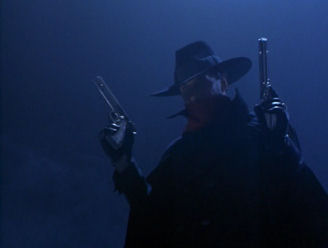 *[Yin-ko’s translation of this term, “holy man,” is a pedestrian and paltry mistranslation, the equivalent of confusing a “saint” for a “monk.” A tulku is one who has forsaken the peace of Nirvana and committing himself to continuous reincarnation, the better to fulfill his Four Fold Vows and eventually liberate all sentient beings from this futile cycle of birth and death we know as existence and they know as “samsara.” Your stereotypical wandering Buddhist (seen in many a Kung Fu film) is a “holy man,” but the Dali Lama—now there’s a tulku.]
*[Yin-ko’s translation of this term, “holy man,” is a pedestrian and paltry mistranslation, the equivalent of confusing a “saint” for a “monk.” A tulku is one who has forsaken the peace of Nirvana and committing himself to continuous reincarnation, the better to fulfill his Four Fold Vows and eventually liberate all sentient beings from this futile cycle of birth and death we know as existence and they know as “samsara.” Your stereotypical wandering Buddhist (seen in many a Kung Fu film) is a “holy man,” but the Dali Lama—now there’s a tulku.]
Fast-forward seven years and we find Cranston in “that most wretched lair of villainy we know as…New York City.” (Ah, for a pre-9/11 world, before the deification of New York.) Would that I were my father and I could pin down the exact year this takes place from the car we see pulling to a stop on the side of the Manhattan Bridge. Three obvious gangsters emerge, hauling out a fourth man (Sab Shimono) they’ve fitted with cement slippers.
The three gangsters are foiled in their attempted murder by a mysterious voice that taunts them and laughs hysterically from the darkness. “Did you think you’d get away with it?” the voice asks. “Did you think I wouldn’t know?” An invisible presence stalks among them, dealing out knuckle sandwiches and eventually holding their leader, Duke, over the side of the bridge until he swears to confess to his cop-killing ways. This moral awakening earns Duke a trip through his own car’s windshield and a man in a long, black cloak and wide-brimmed fedora, the lower half his face hidden behind a red scarf, appears to Duke’s two minions. Beholding the Shadow, they flee in terror.
As a cab* pulls up beside them, the Shadow turns his attention to the Asian man he’s just saved. “You’re Dr. Roy Tam,” he says, once they’re safely speeding away (ah, for a pre-speed limit world), “a professor in the Science Department at NYU…I’ve saved your life, Roy Tam. It now belongs to me…You’ll become one of my agents, just like dozens of others all over the world.” Like all the best secret clubs, agents of the Shadow are provided with a code phrase, the better to identify each other, and a rather-obvious fire-opal ring, the better to make them stand out in a crowd (scene). A new recruit duly initiated and dropped off on the curb, the Shadow orders his driver, one Mr. Moe Shrevnitz (Peter Boyle, whom I’ll forever remember as Clyde Druckman, the man who gave Special Agent Dana Scully her short-lived, ill-fated dog, Queequeg) to “the Cobalt Club.”
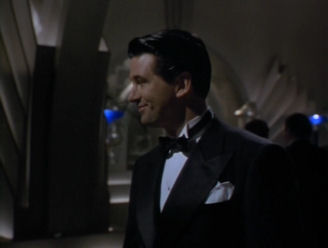 *[My girlfriend rightly notes that the Shadow’s choice of ride is among the “best superhero cars ever. A taxi cab in New York. Who the fuck’s going to notice that?”]
*[My girlfriend rightly notes that the Shadow’s choice of ride is among the “best superhero cars ever. A taxi cab in New York. Who the fuck’s going to notice that?”]
Like the Green Hornet after him, the Shadow has a chauffeur. Like Batman, he maintains a dual identity as Lamont Cranston, idlest of the idle rich. Inside the Club, his uncle Wainwright (Jonathan Winters) berates him for being an hour late. Like James Bond, Lamont is far too busy eying the hot blond across the room to give a toss.
Unlike his antecedents, the Shadow is a veteran of “the War” (what we call “World War I”) and not above actions the above mentioned heroes might find distasteful, if not downright villainish. His weapons of choice are two silver .45 automatics, and he’ll be none-too-shy about using them over the course of this film. His agent recruitment policy amounts to a form of extortion, and he frequently uses his ability to “cloud men’s minds” on friends, family members, dates, and even casual acquaintances.
Example: as he turns from the hot blond, Lamont sees Uncle Wainwright (also Police Commissioner Wainwright) receive “another report about this ‘Shadow’ character.” A very melodramatic (almost silent movie-era) shadow descends across Lamont’s face. His eyes grow as black and wide as a Grey alien’s and he tells his apparently-beloved uncle, “There is no Shadow.” “There is no Shadow,” Uncle Wainwright confirms. “If there were, I’d be Eleanor Roosevelt.” Ah. So it must be sometime in the mid- to late-1930s.
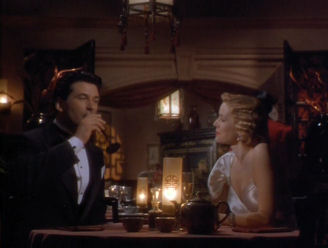 The hot blond, it so happens, is one Margo Lane (Penelope Ann Miller), uber-daughter of “a scientist working for the War Department…she hears voices,” Uncle Wainwright says. “That’s what they say.” Cranston soon learns why. Over dinner, he discovers Margo has the power to read his mind, leading to a “stimulating evening.” As hooks go, this is quite the initial one: Mind-Altering Superhero meets Psychic Girl. As far as that goes, they’re beautifully wrong for each other, and the look of total panic on Lamont’s face is priceless. He drops her off with a handshake goodnight and swears to Moe he’ll never see her again. “It’s much too dangerous.” “For who?” “For me, Moe. For me.”
The hot blond, it so happens, is one Margo Lane (Penelope Ann Miller), uber-daughter of “a scientist working for the War Department…she hears voices,” Uncle Wainwright says. “That’s what they say.” Cranston soon learns why. Over dinner, he discovers Margo has the power to read his mind, leading to a “stimulating evening.” As hooks go, this is quite the initial one: Mind-Altering Superhero meets Psychic Girl. As far as that goes, they’re beautifully wrong for each other, and the look of total panic on Lamont’s face is priceless. He drops her off with a handshake goodnight and swears to Moe he’ll never see her again. “It’s much too dangerous.” “For who?” “For me, Moe. For me.”
A prophetic dream later and Cranston knows, “Someone’s coming.” Indeed, they’ve already arrived at the Museum of Natural History, where three late working gents (the British person is Max Wright, better known as Willie Tanner from Alf; the security guard is Ethan Phillips, better known around here as Neelix from Star Trek: Voyager) are shocked to discover someone has just dropped the legendary silver coffin of Genghis Kahn on their doorstep. It pops open, revealing, not Genghis, but Shiwan Kahn (John Lone), the Last Descendent of Genghis Kahn—as he never seems to tire of reminding us. He’ll be Our Villain for the remainder of the picture. We know he’s the villain as, in his first act, he uses his mind-clouding powers to send Mr. Neelix off to Suicide Slum.
Cut to Margo Lane’s father, Dr. Reinhart Lane (played by the almost-unrecognizable Ian McKellen) this film’s Scientist, who’s working on a “beryllium sphere” down at the U.S. Federal Building. Dr. Lane says he’s working on “energy research” but as his research partner is one Farley Claymore (played by the always-seedy Tim Curry) we know at once that All Is Not As It Appears. Claymore soon betrays himself by making an over-acted pass at Margo, who tells him in no uncertain terms that she does not like him. Neither do I. He’s a Warner Brother’s cartoon villain (from somewhere in the 60s, as opposed to the villains of 2001’s Justice League show who are much more well-rounded) in a pulp-novel movie, throwing the whole proceedings out of whack with the gravity of his corniness…a gravity unmatched by the other characters, who all seem to take these things seriously.
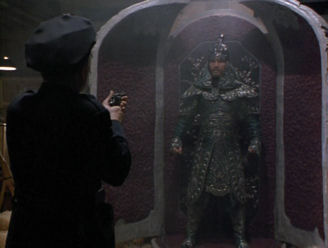 After a scene with Margo and her father, we go to what I nicknamed Stately Cranston Manor. Where the hell does Lamont live, anyway? The skyline of Depression-era New York is totally unrecognizable to we children of the twenty-first century. Upper West Side? Upper East? The Heights?
After a scene with Margo and her father, we go to what I nicknamed Stately Cranston Manor. Where the hell does Lamont live, anyway? The skyline of Depression-era New York is totally unrecognizable to we children of the twenty-first century. Upper West Side? Upper East? The Heights?
Whatever the case, his home away from home is “the Sanctum,” a secret underground lair in some anonymous alley just off of Times Square. (Because if it were anywhere else it just wouldn’t be as cool.) Complete with roaring fireplace, elaborate staircase, more books than most lawyer’s offices and (in a beautiful touch left totally unexplored by the filmmakers) a TV-phone, the Sanctum makes any bachelor pad of the time look like a tenement flat. I guess Philo Farnsworth’s life must belong to the Shadow as well. I can see him toiling over a cathode ray tube somewhere (if this really as the 1930s, he’s somewhere in Europe, maybe even Nazi Germany), a big fire-opal ring hanging off his right hand, even as (thousands of miles away) Shiwan Kahn sneaks into the Shadow’s Sanctum.
This is meant to inform us that Our Villain is no external threat to Our Hero; that he, is, in fact, a force to be dealt with. You don’t see the Joker casually strolling into the Batcave to deliver a monologue. But here’s Kahn, proving his villain chops with a little bit of history, motivation and biography. The Last Descendant turns out to be a student of the Tulku, who spoke of Lamont “constantly. But I’m afraid he wasn’t able to turn me quite as easily.” With or without his “unique ability to cloud men’s minds,” we soon learn Kahn’s got this megalomania thing down pat. “Genghis Kahn conquered half the world in his lifetime. I intend to finish the job.” Playing the dapper chap, Lamont asks how this might be accomplished. “If I told you,” Kahn says, “it would not be a surprise.”
Nevertheless, Kahn drops enough hints and the Shadow soon knows exactly what’s going on. In the course of his monologueing, Kahn buys some bourbon off of Lamont, paying with an exotic Asian coin. A quick jaunt to the recently-recruited Dr. Tam and the metal in the coin is identified as “bronzium.” “Supposedly it’s very unstable on the molecular level,” Dr. Tam says. Why screenwriter David Koepp shies away from the word “radioactive” is beyond me…though I appreciate the following exchange: “Fashioned into a bomb it would be catastrophic,” Dr. Tam says. “I guess you’d call it an implosive, explosive, sub-molecular device.”
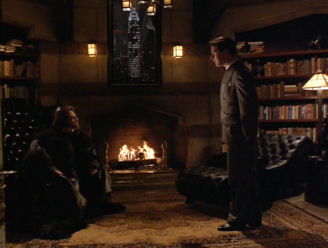 “Or an atomic bomb,” Lamont offers. The scientist gives an imperceptible nod, pronouncing the term, “catchy.” Of course, “None of this would be possible…unless some genius figures out how to design and make it.” Some genius like the absent-minded Dr. Reinhart Lane, perhaps.
“Or an atomic bomb,” Lamont offers. The scientist gives an imperceptible nod, pronouncing the term, “catchy.” Of course, “None of this would be possible…unless some genius figures out how to design and make it.” Some genius like the absent-minded Dr. Reinhart Lane, perhaps.
Kahn is, of course, already ahead of us, and fully in control of the Dr. Lane’s absent-mind. It takes Margo bursting in on another Cranston-Uncle Wainwright dinner date for Lamont to put the pieces together. Margo moves to go with him, but the Shadow needs no sidekicks (only, it seems, a vast and growing population of Agents). The shadows cloud his face as he orders Margo to “forget about me. You will give me no further thought.”
“Why would I do that?” she asks. “Are you drunk?”
Psychically emasculated, Lamont flees to his fight scene, arriving only minutes behind Kahn’s imported squad of Mongol warriors (complete with battle dress, crossbows, and swords…why the Last Descendant of Genghis Kahn would shun modern, deadly weaponry is, once again, beyond me). Yet, for all his superior training and skill, the Shadow is unable to prevent Dr. Lane’s abduction, his one captive (in true movie-villain fashion) choosing suicide over interrogation. Potential superheroes of the world take heed: this is what happens when your fight scenes are choreographed, not to achieve goals, but to show off special effects.
Cut to Margo as she receives a call from her father (at Shiwan Kahn’s direction) telling her to come to the lab. We’re forced to ask why she isn’t already there. Wouldn’t that just make things move faster? And we are moving at a fast clip now. With the movie’s central concept already out of the closet there’s precious little to do…except have someone fall in love.
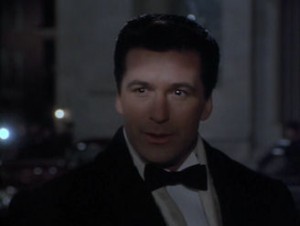 I will give the movie this: it gifts us with one of the best Secret Identity reveals in the history of superhero/significant other relations. Can you imagine Margo telling this story to a gaggle of Cranston kids? “The day I fell in love with your father was a day I’ll never forget: His arch nemesis Kahn kidnapped me, brainwashed me, wound me up like a steadfast tin soldier, and sent me out to fill your daddy full of lead. It was so romantic.”
I will give the movie this: it gifts us with one of the best Secret Identity reveals in the history of superhero/significant other relations. Can you imagine Margo telling this story to a gaggle of Cranston kids? “The day I fell in love with your father was a day I’ll never forget: His arch nemesis Kahn kidnapped me, brainwashed me, wound me up like a steadfast tin soldier, and sent me out to fill your daddy full of lead. It was so romantic.”
Historically, Margo Lane provided a gal Friday figure for the Shadow, a shinning female star in a radio cast full of men, providing vocal contrast and someone to talk to. As the movie winds down she comes to fulfill this role, and given the confines of the story I suppose this bit proceeds as smoothly as possible. Reciprocal life-saving ensues, with spit-swapping lingering right around the corner. First, Kahn must be defeated and New York duly saved. As if something else would happen.
We expect that, sure. And given the lead-up we’ve just witnessed (and the fact that Stan Winston is one of this film’s Executive Producers) we’d expect a world-saving extravaganza to rival the Superman or Batman films of that age. The valiant, invisible hero dulling out transparent punishment to an army of Mongol barbarians, before engaging Our Villain in a protracted fight to the bitter end, his inevitable victory culminated when Margo rushes into his arms, the both of them lip-locking off into the sunset.
 The entire rear of the film smacks of injudicious editing, as if the last reel fell into an unfortunately-placed wood chipper. I sense an initial test screening that went badly. People probably found the movie “boring” “overlong” or “confusing.” If you believe the Industry, test screening audiences are easily confused. I, personally, was confused by the fate of Kahn’s three remaining Mongol henchmen. At the end of the film they simply disappear. The Shadow spends all his time dealing with Tim Curry and proceeds directly to the Final Confrontation. Or the fact that Kahn’s mind-clouding Whammy works on Margo (from half a city away, no less) where, three scenes before, the Shadow’s so spectacularly failed. Are we meant to infer that this reflects Kahn’s greater degree of self-control? His higher level of spiritual enlightenment? Or the fact that I’m giving this much more thought than David Koepp did?
The entire rear of the film smacks of injudicious editing, as if the last reel fell into an unfortunately-placed wood chipper. I sense an initial test screening that went badly. People probably found the movie “boring” “overlong” or “confusing.” If you believe the Industry, test screening audiences are easily confused. I, personally, was confused by the fate of Kahn’s three remaining Mongol henchmen. At the end of the film they simply disappear. The Shadow spends all his time dealing with Tim Curry and proceeds directly to the Final Confrontation. Or the fact that Kahn’s mind-clouding Whammy works on Margo (from half a city away, no less) where, three scenes before, the Shadow’s so spectacularly failed. Are we meant to infer that this reflects Kahn’s greater degree of self-control? His higher level of spiritual enlightenment? Or the fact that I’m giving this much more thought than David Koepp did?
All this superhero jazz is well and good…but sometimes, a man needs more. I need some protein with my empty carbohydrates. I need a good steak. This movie denies me my steak. Indeed, denies steak to all of us, by declining to answer the and only interesting issue that it raises, the issue of redemption.
“I know who you really are,” Kahn says to the Shadow. “You are Yin-ko, the butcher of Lassa. You, and only you deserve to be by my side.” (Take note: writing like this that makes you a success in Hollywood. I’ll tell you right now, Nathan—you’re too good for these people.)
The former Yin-ko, on the other hand, has a serious problem with denial. On the surface, he responds to the name “Cranston” readily enough. At the beginning of the film he calls it his “real” name. This is partially a script convenience. Koepp decided early on that the Shadow’s classical origin was too convoluted (or “confusing”) for the modern movie-goer. Originally, the Shadow wore the name of Kent Allard whenever he was among friends (like Margo) and only picked up his Cranston identity upon returning to America.
If we choose to believe this Cranston, we’re still left with a hero who appears to change names as easily as I change shirts. His perception-clouding powers even gift him with a form of shape shifting. I’d be surprised if even he knows who he really is anymore. If he doesn’t, then he’s a dangerous, superpowered sociopath, the kind of person the heroes of today, the very heroes his existence helped create, would hunt down and jail with their singular zeal. I can imagine Batman cracking Lamont’s little operation in all of twenty minutes with no mind-clouding power required. Simply tailing Cranston to his Sanctum would do it.
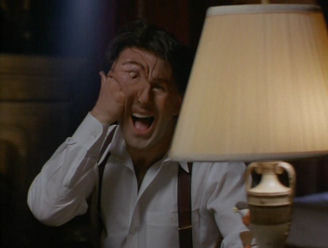 Midway through the film, Cranston dreams of peeling off his face, revealing the face of Shiwan Kahn to a screaming, scantily clad Margo. (Seriously, did they reanimate Faye Wray’s costume designers?) “You have problems,” Margo tells him the next morning. “I’m aware of that,” he says. But nowhere does he take any steps to address this. Nowhere does he move beyond the first of his twelve steps. Instead, he wraps his face in a scarf and some semi-mystical powers, taking out his anger, his violent tendencies, and his warped sense of humor on criminals.
Midway through the film, Cranston dreams of peeling off his face, revealing the face of Shiwan Kahn to a screaming, scantily clad Margo. (Seriously, did they reanimate Faye Wray’s costume designers?) “You have problems,” Margo tells him the next morning. “I’m aware of that,” he says. But nowhere does he take any steps to address this. Nowhere does he move beyond the first of his twelve steps. Instead, he wraps his face in a scarf and some semi-mystical powers, taking out his anger, his violent tendencies, and his warped sense of humor on criminals.
As the third act draws to a close there is a small moment when Margo’s psychic powers give her a peak into Lamont’s more “ordinary” dreams. She sees a bloody (too-brief and too-tame for my Braveheart watching eyes—this is PG-13, don’t you know) vision of Lamont’s—or Yin-ko’s—past. The following Intimate Moment is as close as Lamont’s identity crisis ever comes to a resolution. I would like to think such a thing was purposefully left out, the better to provide the Inevitable Sequel (or so they thought of it) with much-needed emotional content. But I don’t think that’s the truth.
I think this movie was a lazy excuse for a superhero story, written in a transitional time only five years after Tim Burton’s Batman, only two years into the arguably more-influential Animated Series of the same name. At this point, few filmmakers had sensed the filmic potential of the superhero story. It’s ironic that Sam Raimi, of all people, would be the one to show us that potential almost a decade later with his first two Spider-Man films. (Let’s ignore, for the moment, Spider-Man 3.)
What, by contrast, has Russell Mulcahy contributed to genre film lately? Resident Evil: Extinction? Or was 3: The Dale Earnhart Story meant as a superhero film? At least David Koepp’s kept it in the family. Indeed, The Shadow seems to have ruined all the careers it was meant to make. Alec Baldwin and his family are a national joke. Mulcahy has languished in Made for TV land (and as an early graduate of the MTV University of Film Making through Music Videos, he’s right at home, believe me). The only recognizable successes to rise from this film were either established actors (James Hong, Boyle, McKellen) or non-entity bit-players (Ethan Phillips…and watch for a cameo by Robert Trebor, better known to you as Salmoneus from Xena: Warrior Princess.)
The Shadow can’t even claim any original contributions to the form. It was rightly panned at the time for its derivative nature—but not, mind you, because of the thematic debt it owes to Tim Burton. No, this story is (at best) a patchwork of existing Shadow stories, many of whom could easily be summed up thus: “The Shadow foils the world-conquering designs of an unscrupulous foreigner and his barbarian hordes, then gets laid. The End.” It’s one narrative surprise, the “implosion/explosion sub-molecular devise,” is revealed half way through the movie, leaving us plenty of time to get used to the idea and begin waiting.
Lamont’s quest for redemption is meant to fill that gap, but swapping spit with a psychic socialite does not automatically bequeath redemption. The film doesn’t pause in its End to give us any sign that Lamont’s gained some perspective on his lonely, vengeful excuse for a life. Or that Margo has any idea what she’s getting herself into, entering into a relationship with a masked vigilante. She may be a graduate of Debutante University, but she’s not Mary Jane Watson and sure as hell no Lois Lane. Their final exchange, which ends the film (“How will you know where I am?” “I’ll know.”) does nothing but creep my shit out. “That right there,” I thought, and still think now, “is a false-ringing, bullshit storybook ending to a story that’s just beginning.”
If this is really a story of redemption, why isn’t the Lamont/Margo relationship a central pillar of the film, rather than a convenient plot device? If this is a straight-up superhero yarn, then why stop the plot in its tracks for an Intimate Moment or an “Adult Supervision Required” dream sequence? If this is supposed to be a good movie, then why did its makers assume a few CGI effects and Penelope’s barrage of skimpy dresses will distract me from its obvious failings? Is there some subconscious (or not-so-subconscious) form of Hollywood classicism that assumes we Middle Americans are pacified by titties and violence? Did the people involved honestly believe they were making a good movie?
No need to answer. The sad thing is, I already know. But seeing millions of dollars poured into a project that doesn’t even live up to itself—its promises, its potentials, or the intentions of its creators—that’s the saddest thing of all. That’s why The Shadow is largely forgotten in this age of the superhero movie “renaissance.” Deservedly so.
![]()
![]()

oh cmon now, the movie was fun and is now looked at as one of the classics of the genre of the 90’s along with the Batman films (which started it all), the Phantom, Rockateer, Dick Tracy, and others I probably haven’t mentioned. the film may not have done well at the box office at the time, but has certainly garnered a reputation as being just a plain fun movie with some great performances all around. seems everyone today is a critic and leaning towards hate, UNLESS of course you have some hack like Christopher Nolan who basically does his own realistic bullshit take on everything, makes the movies forgettable and overly complicated, does away with any old fashioned film noir comic book feel and basically just makes it very modern and today, making it a dated pretentious overly serious jumbled mess. the shadow is a cool, slick, clever adventure film with some very interesting characters and cool hero you can understand. people need to stop being critics and hateing everything that is essentially escapist fun. not everything has to be gritty complex super serious humourless farce. sometimes, fun is the best ingredient, and this movie certainly delivers it while still be atmospheric and fathful to the characters origins.
“Garnered a reputation” from whom? Not from me, that’s for damn sure. And when did run-of-the-mill, committee-designed wanna-be-blockbusters from the 90s become “classics”? Is this Nostalgia’s dead hand finally reaching out to grasp the films of my adolescence? If so, when do the nostalgic re-evaluations of Wild Wild West and Roland Emmerich’s Godzilla get here? When do we get to say those are “looked at as” “classics of the genre”?
I’ll give you The Rocketeer, though. Rocketeer‘s awesome.
At this point, I throw up my hands. We weren’t even talking about Nolan (or, at least, I wasn’t) and there you go, venting your impotent rage because I dared to have an opinion contrary to your own. Do you even know or care what I thought about his Bat-films? You could’ve easily attached this rant to either one of those reviews and it would’ve at least been appropriate. But you didn’t, because you’re oh-so-well-thought-out statement on the state of modern online film criticism obviously HAD to be heard, and you had to type it into this because you love Shadow, I made you mad, and your ego couldn’t stand the injury. Then you thought better of it and backpedaled, finally throwing in some actual (if primary school-level) praise for the film in this page’s Title once you’d excised your own Hate. And you think that’ll save you?
Newsflash, wildman: it won’t. Anger clouds the mind. I could easily let it cloud my mind and dismiss you, and everyone else who doesn’t march in lock-step with my opinions, as “haters.” But I don’t because, if I did, no one would read these pages, and I’d be Alone.
I get it: you’re sick of seeing people who aren’t me throw roses at Nolan’s feet. I understand. Nothing’s more annoying than watching other people be happy, (“have fun,” you might say) especially when you’re a miserable jerk. All I ask is that you grown a pair and go troll people who deserve it. Ebert may be dead but Peter Travers isn’t going anywhere. And pissing in my pond won’t make you any friends…unless there’s some message board somewhere dedicated to hating me. And if so, I’d love to get their address, create some kind of anti-sock puppet account, and smear my own good name. Who’s going to have more inside dirt on me than me?
Is one of my favorite superhero movie of all times… I don’t understand why try to convince others that something is bad in such length.